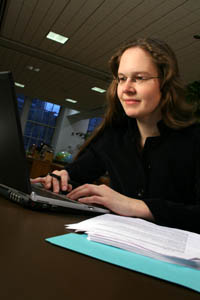Using Feedback Effectively
 With communication, feedback comes in many forms, from written and verbal to modifying behavior. In the case of Monica van de Ridder, a graduate student from the Netherlands, her “positive” feedback to a talk given by William C. McGaghie, PhD, professor of medical education and faculty development, resulted in a plane ticket to Chicago.
With communication, feedback comes in many forms, from written and verbal to modifying behavior. In the case of Monica van de Ridder, a graduate student from the Netherlands, her “positive” feedback to a talk given by William C. McGaghie, PhD, professor of medical education and faculty development, resulted in a plane ticket to Chicago.
“I met Bill at a conference in Switzerland in 2003 when I was just starting my PhD program,” explains van de Ridder, whose doctoral studies focus on feedback processes in clinical education. “He was giving a workshop on mastering the scholarly process, and I thought he gave some very useful advice like finding a good mentor.” Van de Ridder took Dr. McGaghie’s words to heart and saw in him such an individual. After ongoing correspondence and a meeting in Amsterdam with Dr. McGaghie and her own graduate supervisor, van de Ridder came to the Feinberg School of Medicine last March as a visiting fellow.
Dr. McGaghie is now a member of van de Ridder’s doctoral committee at the University Medical Center in Holland, working with her supervisor, Olle Th J ten Cate. “The Office of Medical Education [OME] has had many foreign visitors,” says Dr. McGaghie, “but I believe Monica is our first foreign graduate student.” Van de Ridder returned to Holland in July but came back for a one-month stint this January to continue her study of the variables that affect feedback in medical education.
Looking at feedback as a tool to improve one’s knowledge, skills, and attitudes and the variables that promote effective and constructive assessments, van de Ridder spent the summer observing the clinical teaching environment at the Feinberg School. She shadowed Marianne M. Green, MD, assistant professor of clinical medicine, on morning rounds at Northwestern Memorial Hospital where she observed the interactions among attending physicians, residents, and medical students.
“So many variables influence feedback, from how it is given and received to its content and form—how it is said and from whom. Where and when it is given is also important,” explains van de Ridder, who observed the clinical training of Dutch medical students and residents at her home university before coming to Northwestern. “Is it one on one? Are other medical students present? Is the feedback being given in front of a patient, which might make the student even more anxious the next time he or she works with this patient?”
The dynamic nature of the clinical environment—time pressures, heavy workloads, and risks to patients—make the education of medical students and training of residents unique, according to van de Ridder, who holds a master’s degree in educational sciences. Van de Ridder notes that while the field of medicine has a rich tradition of teaching at all levels, oftentimes those doing the instructing have been trained as patient care providers rather than educators. She hopes through her research to better understand the factors that influence the clinical learning process to improve medical education and ultimately patient care.
“Feedback providers can benefit from knowing how, for example, to create a safe environment where students find the feedback to be instructive rather than humiliating,” explains van de Ridder. “Sometimes taking a softer approach by saying, ‘We all can learn from each others’ mistakes’ rather than focusing on individual weaknesses helps feedback recipients to more readily accept assessments of their performance and change their behavior appropriately to produce the desired outcome.”
In Holland van de Ridder has given training sessions to physicians on providing feedback. One of her tips—asking students what they thought of their own performances—can help to shape the information exchange. Remarks van de Ridder, “By getting a sense of what the student is thinking, the feedback provider can appropriately tailor his or her message to the situation.”
While too soon for van de Ridder to draw any conclusions from her research or make definitive comparisons of U.S. and Dutch medical students and residents, she does believe cultural differences such as open-mindedness may have a bearing on learning. “From what I have seen Americans don’t judge right away but seem to accept different views, maybe because they are exposed to many cultural differences,” notes van de Ridder, whose arrival in Chicago last year was her first visit to the United States. “They also have a ‘can do’ mentality—set your goals and go for it.”






